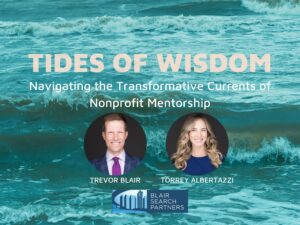
By Torrey Abertazzi, Director of Operations
Blair Search Partners
In the ever-evolving nonprofit landscape, the transformative influence of mentorship goes beyond structured programs. It extends to the collective wisdom embedded in every corner of the organization, emphasizing that mentors are not limited to specific roles or titles. Mentors can emerge organically from various and sometimes unexpected sources, creating a dynamic network of learning.
Research consistently highlights the positive impact of mentorship on individual and organizational success. An American Society for Training and Development survey reveals that 75% of executives credit mentoring for shaping their careers. Several reports underscore that organizations with robust mentorship initiatives witness heightened employee satisfaction and retention rates.
Yet, the true essence of mentorship lies in recognizing that everyone around you, irrespective of their position, contributes to your professional growth. Peer mentoring, often gleaned through observation and personal experiences, plays a pivotal role. Leaders at all levels become inadvertent mentors, providing valuable insights through their actions, both positive and negative. As you look to your mentor, remember you have an opportunity to mentor them, too.
The richness of mentorship is amplified by the diversity of perspectives —arising from professional or lived experience, age, gender, culture, and more. Like the ebb and flow of ocean waves, mentorship gains momentum as individuals contribute their diverse perspectives, creating a dynamic tide of shared knowledge and growth.
Crucial for its success, mentorship becomes a holistic journey of learning the dos and don’ts. Harvard Business Review research indicates that many failed mentorship relationships result from a lack of communication and commitment.
Dos: fostering open communication, setting clear expectations, encouraging check-ins, providing constructive feedback, and cultivating a culture of learning.
Don’ts: dictating solutions, neglecting individual differences, assuming a one-size-fits-all approach, and overlooking diversity.
Mentorship in nonprofits is a reciprocal dance, fostering a rhythmic ocean of growth and empowerment that honors the beauty of diverse perspectives in leadership. It thrives not only in structured programs but in everyday interactions and observations that shape an organization’s culture. By acknowledging that mentors are everyone around you, nonprofits tap into a wellspring of knowledge, propelling individuals and the organization toward sustained success.
